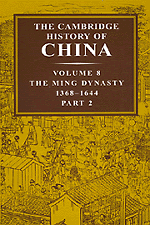Book contents
- Frontmatter
- Introduction
- 1 Ming government
- 2 The Ming fiscal administration
- 3 Ming law
- 4 The Ming and Inner Asia
- 5 Sino-Korean tributary relations under the Ming
- 6 Ming foreign relations: Southeast Asia
- 7 Relations with maritime Europeans, 1514–1662
- 8 Ming China and the emerging world economy, c. 1470–1650
- 9 The socio-economic development of rural China during the Ming
- 10 Communications and commerce
- 11 Confucian learning in late Ming thought
- 12 Learning from Heaven: the introduction of Christianity and other Western ideas into late Ming China
- 13 Official religion in the Ming
- 14 Ming Buddhism
- 15 Taoism in Ming culture
- Bibliographic notes
- Bibliography
- Glossary-Index
Bibliographic notes
Published online by Cambridge University Press: 28 March 2008
- Frontmatter
- Introduction
- 1 Ming government
- 2 The Ming fiscal administration
- 3 Ming law
- 4 The Ming and Inner Asia
- 5 Sino-Korean tributary relations under the Ming
- 6 Ming foreign relations: Southeast Asia
- 7 Relations with maritime Europeans, 1514–1662
- 8 Ming China and the emerging world economy, c. 1470–1650
- 9 The socio-economic development of rural China during the Ming
- 10 Communications and commerce
- 11 Confucian learning in late Ming thought
- 12 Learning from Heaven: the introduction of Christianity and other Western ideas into late Ming China
- 13 Official religion in the Ming
- 14 Ming Buddhism
- 15 Taoism in Ming culture
- Bibliographic notes
- Bibliography
- Glossary-Index
Summary
APPENDIX
The subject matter of the individual chapters included in this volume is very diverse, and both the extant original sources and the secondary scholarship devoted to them varies greatly in its complexity. All the chapters provide in their footnotes references both to the major sources and to the most important secondary studies. Some of them, however, have an unusually complicated and wide ranging literature, and the authors have provided, in the following bibliographical notes, some guidance to the scholarship available on their field
BIBLIOGRAPHIC NOTES
THE MING AND INNER ASIA BY MORRIS ROSSABI
The Ming Shih-lu is still, despite the drawbacks described by Wolfgang Franke and others, the most important primary source on Ming relations with Inner Asia. Japanese scholars have facilitated use of the voluminous records in the Shih-lu by extracting and compiling the materials on Mongolia, Manchuria, Tibet, and the Western Regions, the Chinese designation for Central Asia. They have also extracted the materials on Korea and Manchuria found in the Yijo sillok, the Yi dynasty chronicle. I have provided a preliminary analysis of the value of these sources in my "Ming China's relations with Hami and Central Asia."
- Type
- Chapter
- Information
- The Cambridge History of China , pp. 987 - 1004Publisher: Cambridge University PressPrint publication year: 1998

